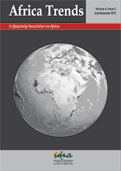Exit of the African Union-United Nations Hybrid Operation in Darfur (UNAMID)
UNAMID's exit did not emerge from a context of peace or progress towards conflict resolution in Darfur. Instead, the exit decision was essentially the outcome of the reflection that keeping the mission on the ground would not change the situation. Initially, the hybrid peacekeeping model was seen as a paradigm shift in peacekeeping operations, and many hailed it as the future of UN peace operations.
- Rajeesh Kumar |
- January-December 2021 |
- Africa Trends





